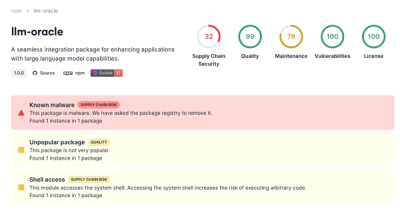
Security News
Dutch National Police Disrupt Redline and Meta Malware Operations
Dutch National Police and FBI dismantle Redline and Meta infostealer malware-as-a-service operations in Operation Magnus, seizing servers and source code.
@whatwg-node/node-fetch
Advanced tools
Fetch API implementation for Node
@whatwg-node/node-fetch is a Node.js implementation of the Fetch API, which is a modern, promise-based way to make HTTP requests. It is designed to be a lightweight and efficient way to handle HTTP requests and responses, similar to the Fetch API available in web browsers.
Basic GET Request
This feature allows you to make a basic GET request to a specified URL and handle the response. The response is converted to JSON and logged to the console.
const fetch = require('@whatwg-node/node-fetch');
fetch('https://jsonplaceholder.typicode.com/posts/1')
.then(response => response.json())
.then(data => console.log(data))
.catch(error => console.error('Error:', error));POST Request with JSON Body
This feature allows you to make a POST request with a JSON body. The request includes headers to specify the content type and a body with the data to be sent.
const fetch = require('@whatwg-node/node-fetch');
fetch('https://jsonplaceholder.typicode.com/posts', {
method: 'POST',
headers: {
'Content-Type': 'application/json'
},
body: JSON.stringify({
title: 'foo',
body: 'bar',
userId: 1
})
})
.then(response => response.json())
.then(data => console.log(data))
.catch(error => console.error('Error:', error));Handling Response Headers
This feature demonstrates how to access and log the response headers from an HTTP request. The headers are logged before the response body is processed.
const fetch = require('@whatwg-node/node-fetch');
fetch('https://jsonplaceholder.typicode.com/posts/1')
.then(response => {
console.log('Headers:', response.headers.raw());
return response.json();
})
.then(data => console.log(data))
.catch(error => console.error('Error:', error));node-fetch is another implementation of the Fetch API for Node.js. It is widely used and has a similar API to @whatwg-node/node-fetch. However, node-fetch is more mature and has a larger user base.
axios is a promise-based HTTP client for Node.js and the browser. It provides a more feature-rich API compared to @whatwg-node/node-fetch, including support for request and response interceptors, automatic JSON transformation, and more.
got is a human-friendly and powerful HTTP request library for Node.js. It offers a more extensive set of features compared to @whatwg-node/node-fetch, such as retry mechanisms, advanced error handling, and support for streams.
FAQs
Fetch API implementation for Node
The npm package @whatwg-node/node-fetch receives a total of 5,031,663 weekly downloads. As such, @whatwg-node/node-fetch popularity was classified as popular.
We found that @whatwg-node/node-fetch demonstrated a healthy version release cadence and project activity because the last version was released less than a year ago. It has 1 open source maintainer collaborating on the project.
Did you know?

Socket for GitHub automatically highlights issues in each pull request and monitors the health of all your open source dependencies. Discover the contents of your packages and block harmful activity before you install or update your dependencies.

Security News
Dutch National Police and FBI dismantle Redline and Meta infostealer malware-as-a-service operations in Operation Magnus, seizing servers and source code.

Research
Security News
Socket is tracking a new trend where malicious actors are now exploiting the popularity of LLM research to spread malware through seemingly useful open source packages.

Security News
Research
Noxia, a new dark web bulletproof host, offers dirt cheap servers for Python, Node.js, Go, and Rust, enabling cybercriminals to distribute malware and execute supply chain attacks.